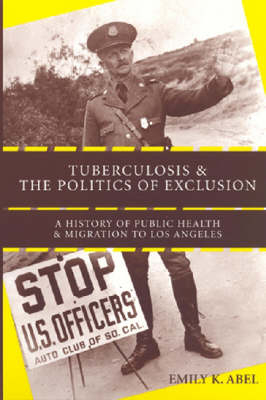
Tuberculosis and the Politics of Exclusion
A History of Public Health and Migration to Los Angeles
Seiten
2007
Rutgers University Press (Verlag)
978-0-8135-4175-4 (ISBN)
Rutgers University Press (Verlag)
978-0-8135-4175-4 (ISBN)
- Keine Verlagsinformationen verfügbar
- Artikel merken
Provides a critical lens through which to view both the contemporary debate about immigration and the US response to the emergent global tuberculosis epidemic. This book shows how the association of the disease with ""tramps"" during the 1880s and 1890s and Dust Bowl refugees during the 1930s provoked exclusionary measures against both groups.
Though notorious for its polluted air today, the city of Los Angeles once touted itself as a health resort. After the arrival of the transcontinental railroad in 1876, publicists launched a campaign to portray the city as the promised land, circulating countless stories of miraculous cures for the sick and debilitated. As more and more migrants poured in, however, a gap emerged between the city's glittering image and its dark reality. In ""Tuberculosis and the Politics of Exclusion"", Emily K. Abel shows how the association of the disease with ""tramps"" during the 1880s and 1890s and Dust Bowl refugees during the 1930s provoked exclusionary measures against both groups. In addition, public health officials sought not only to restrict the entry of Mexicans (the majority of immigrants) during the 1920s but also to expel them during the 1930s. Abel's revealing account provides a critical lens through which to view both the contemporary debate about immigration and the U.S. response to the emergent global tuberculosis epidemic.
Though notorious for its polluted air today, the city of Los Angeles once touted itself as a health resort. After the arrival of the transcontinental railroad in 1876, publicists launched a campaign to portray the city as the promised land, circulating countless stories of miraculous cures for the sick and debilitated. As more and more migrants poured in, however, a gap emerged between the city's glittering image and its dark reality. In ""Tuberculosis and the Politics of Exclusion"", Emily K. Abel shows how the association of the disease with ""tramps"" during the 1880s and 1890s and Dust Bowl refugees during the 1930s provoked exclusionary measures against both groups. In addition, public health officials sought not only to restrict the entry of Mexicans (the majority of immigrants) during the 1920s but also to expel them during the 1930s. Abel's revealing account provides a critical lens through which to view both the contemporary debate about immigration and the U.S. response to the emergent global tuberculosis epidemic.
Emily K. Abel is a professor in the school of public health and women's studies at the University of California, Los Angeles. She is the author and editor of several books, including Suffering in the Land of Sunshine: A Los Angeles Illness Narrative (Rutgers University Press).
| Erscheint lt. Verlag | 30.11.2007 |
|---|---|
| Reihe/Serie | Critical Issues in Health and Medicine Series |
| Zusatzinfo | 20 |
| Verlagsort | New Brunswick, NJ |
| Sprache | englisch |
| Maße | 152 x 229 mm |
| Themenwelt | Geschichte ► Teilgebiete der Geschichte ► Kulturgeschichte |
| Studium ► Querschnittsbereiche ► Epidemiologie / Med. Biometrie | |
| Sozialwissenschaften ► Soziologie | |
| ISBN-10 | 0-8135-4175-1 / 0813541751 |
| ISBN-13 | 978-0-8135-4175-4 / 9780813541754 |
| Zustand | Neuware |
| Haben Sie eine Frage zum Produkt? |
Mehr entdecken
aus dem Bereich
aus dem Bereich
der stille Abschied vom bäuerlichen Leben in Deutschland
Buch | Hardcover (2023)
C.H.Beck (Verlag)
23,00 €
vom Mittelalter bis zur Gegenwart
Buch | Softcover (2024)
C.H.Beck (Verlag)
12,00 €


